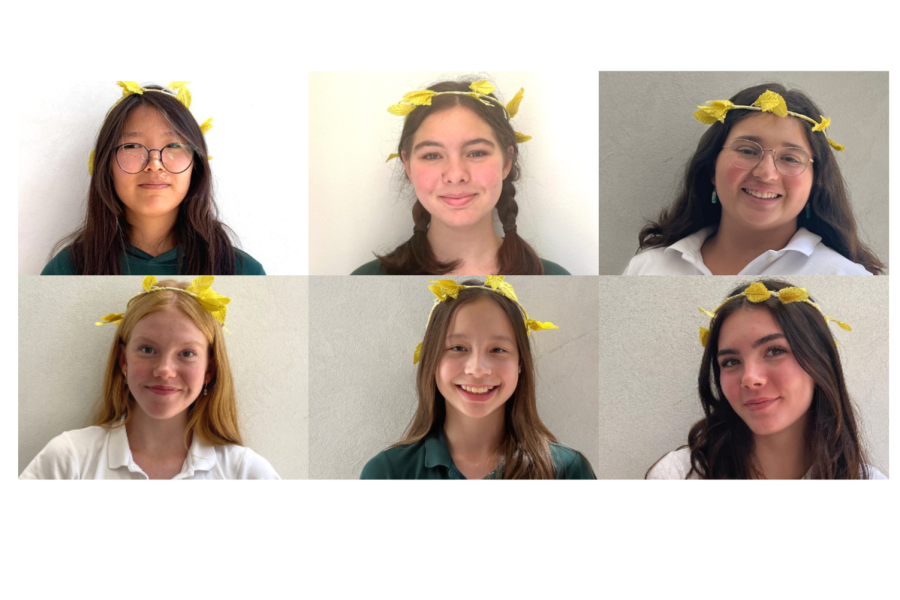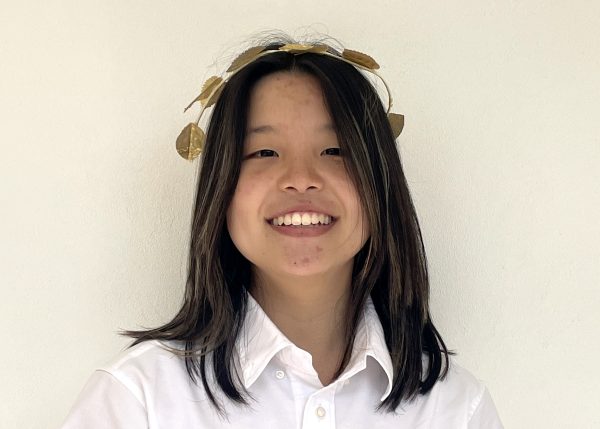#TruthinReporting: Staff reporters reflect on importance of authenticity, objectivity
Six staff pictures feature new Oracle reporters Melinda Wang, Emily Paschall, Sydney Tilles, Oona Seppala, Allegra Carney and Siena Ferraro. Through their experience as journalists, they have learned about the role of truthful, unbiased reporting in both local and national contexts. (Photo compilation of staff photos created by Allie Yang)
February 20, 2023
The Journalism Education Association is celebrating truthful reporting, a fundamental pillar of journalism, Monday, Feb. 20, as the first focus of Scholastic Journalism Week. In honor of this theme, The Oracle spoke to six students who are taking the Introduction to Journalism course about their individual paths of growth as student journalists and how they have deepened their understanding of truthful reporting.
The 2022-2023 Oracle staff is the largest it has been in the history of Archer’s publications program. Even after losing seven seniors in 2022, the staff grew from 17 to 25 with the addition of 15 new staff reporters. Since the start of September, the new reporters have learned about press freedom, the role journalism holds in democracy and the foundational skills of high-quality, ethical journalism.
Sophomore Siena Ferraro said that learning how to report truthfully has helped her highlight topics and events she thought would be ordinary.
“Truthful reporting [is] essential to not only spread factual news, but also to communicate great stories hidden every day,” Ferraro said. “There’s such beauty and truth in something people might find mundane or non-newsworthy.”
Freshman Allegra Carney agreed with Ferraro on the significant role of honesty in journalism. She said reporters should always remain truthful — especially when reporting on current events — so people have access to factual news.
“It’s important to stay truthful because journalism is how we get educated on events happening in the world,” Carney said. “It’s important that all the kinds of media you’re taking in [are] truthful so you’re getting accurate information.”
At the start of the year, students used Checkology, an e-learning platform, to gain a better understanding of media literacy and the different roles of journalism. Freshman Oona Seppala said these roles are connected to the country’s infrastructure and truthful reporting is essential to ethical journalistic practices.
“We [learned] about … our democracy and our government connecting to … the watchdog, agenda-setter and gatekeeper [roles],” Seppala said. “Truth is a foundation journalism has been built upon. Seeking truth and always striving for transparency in our world is a fundamental right and principle.”
Freshman Emily Paschall said she learned more about press freedom through Checkology. She said the lessons made her realize the privilege she has to work in a publication that enables journalists to report stories authentically.
“When we were doing the Checkology modules and learning about press freedom around the world, I felt more grateful about Archer having student press freedom,” Paschall said. “[They] helped me be more aware [of] how lucky we are to go to a school or live in a state that does have freedoms for students.”
Ninth grader Sydney Tilles said when it comes to sources of media and information, journalism has improved her ability to remain impartial and truthful, which has helped her outside of her role as a student journalist.
“I’m definitely more aware of my sources … I’m also better at detecting bias. That’s helped in English and history class with finding sources,” Tilles said. “People read our site — it’s important to be as truthful and unbiased as possible.”
For freshman Melinda Wang, reducing bias has been a key component of her learning as a journalist so far. She said remaining unbiased connects to being truthful, and doing so has supported her in situations where she has had to see multiple sides of a story.
“The most important thing I’ve learned so far is to be unbiased,” Wang said. “That’s helped me outside of journalism [when] viewing conflicts within my own family or community. A more unbiased perspective has let me see clear solutions because I get to work [with] a perspective that’s not really influenced by bias.”
According to JEA, reporting the truth correlates to the idea of allowing readers to create their own sets of beliefs. For Ferraro, she said that she initially didn’t realize that this was a responsibility she would carry as a reporter.
“It’s important to stay truthful because journalism is how we can get educated on events happening in the world,” Ferraro said. “Bias is something I didn’t really think about and that goes in hand with being truthful because if an article is truthful and unbiased, you’re able to make your own thoughts and opinions on it.”









